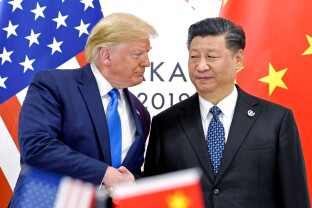As President Trump prepares to meet Chinese leader Xi Jinping in South Korea this week, senators from both parties say the U.S. position toward Taiwan should remain unchanged and off the table in any trade deal.
Beijing is expected to bring up Taiwan on Thursday, along with tariffs and rare-earths. Xi will seek a U.S. statement that Washington “opposes” Taiwan independence, The Wall Street Journal reported, which would be a tougher line than saying the U.S. “does not support” Taiwan’s independence, as President Bill Clinton did in 1998. China claims Taiwan as its own and has long pressed for the U.S. to make a more direct statement in its support.
That prospect has lawmakers on alert. Many described the U.S.’s position on Taiwan as a matter of security and credibility, not economics.
Democratic Sen. Tim Kaine of Virginia said he was “very nervous about” whether the U.S. could adjust its stance on Taiwan in the upcoming talks and that he would wait to see what happens at the meeting.
“I would hope to see that the United States would not soften any commitments to Taiwan,” he said.
Fellow Democratic Sen. Mark Kelly of Arizona said he worries about Trump’s grasp of the issue.
“I’m concerned,” he said. “I’m not so sure the president understands all of the issues that we’re dealing with with Taiwan and the history there.”
Under the U.S. “One China” policy, Washington acknowledges China’s claim over Taiwan but does not officially endorse it. The U.S. maintains strong but unofficial ties with Taipei and provides it defensive support under the Taiwan Relations Act. The State Department previously used the phrase “We do not support Taiwan independence” on its website, but it removed the wording earlier this year, prompting criticism from Beijing.
Lawmakers largely support the U.S. continuing to walk a tightrope on Taiwanese independence.
“I think we should continue our policy of supporting Taiwan to deter Communist China from taking them by force,” Sen. Pete Ricketts of Nebraska said. “That has always been our policy. We should continue it.”
Sen. John Cornyn said a compromise would be unacceptable. “We need to maintain our position on Taiwan,” he said.
The administration has downplayed the potential of making a change on Taiwan policy as part of trade talks.
On Wednesday, when asked aboard Air Force One whether he expected Xi to raise the issue, Trump replied, “I don’t know that we’ll even speak about Taiwan. I’m not sure. He may want to ask about it. There’s not that much to ask about. Taiwan is Taiwan.”
U.S. Secretary of State Marco Rubio on Sunday dismissed speculation that Taiwan could become a bargaining chip in upcoming trade talks, telling reporters that no one is considering a trade deal “in exchange for walking away from Taiwan.”
Sen. Dan Sullivan of Alaska said he was reassured by Rubio denying any change in position. “There’s no one talking about that. I’m not concerned about it, but I am always focused on Taiwan,” Sullivan said.
In Taipei, officials downplayed fears of abandonment ahead of the Trump–Xi meeting. Foreign Minister Lin Chia-lung said Taiwan’s ties with Washington remain “very stable,” while Premier Cho Jung-tai insisted the U.S. would not “sell out” the island.
The meeting between Trump and Xi also comes as Congress moves on multiple Taiwan measures. The Senate Foreign Relations Committee last week approved several Taiwan-related bills, including the Deter PRC Aggression Against Taiwan Act, while Congress’s 2026 defense bills authorize $1 billion in new assistance and encourage Taiwan’s participation in regional naval drills.
Across the interviews, senators saw no sign of a policy shift but said Taiwan should stay separate from trade talks. Sen. Chris Van Hollen of Maryland said he supports the long-standing policy and warned that “changing the status quo could be very problematic.”
Sen. Brian Schatz of Hawaii said he sees no reason to alter a policy that “has been held for generations now and both political parties.”
Sen. Rand Paul of Kentucky described the current balance as workable. “The status quo has been going on since the ’70s, and the status quo has worked,” he said.
Some lawmakers drew a hard line. “America stands resolutely with Taiwan, and I do not believe that’s going to change,” said Sen. Ted Cruz of Texas.
Sign in
Log into your free account with your email. Don’t have one?
Check your email for a one-time code.
We sent a 4-digit code to . Enter the pin to confirm your account.
New code will be available in 1:00
Let’s try this again.
We encountered an error with the passcode sent to . Please reenter your email.


